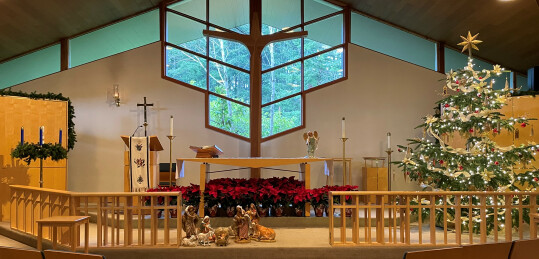January 18 Announcements
Congregational Forum on January 21: A congregational forum will be held following worship this Sunday, January 21. Come join consultant Jonathan Davis, Finch Green board members David Swartling and Tom Croker, and Phedra Elliott of HRB to hear a briefing and discuss next steps in translating the affordable housing of Bethany into a reality. This will be an important gathering, so please join us for the discussion! Those who attend the Saturday evening service are encouraged to come for some coffee fellowship and this forum on Sunday morning.
Advent and Christmas Decorations: Thank you to everyone who helped prepare the sanctuary for Advent and Christmas. Thank you to Linnea Chu, Melanie Olson, Gail Christensen, Nancy Wetzler, and Vicki Bech for preparing the sanctuary for Advent. Thanks to Doug Olson, Mike Bartunek, and Pastor Paul for setting up the tree. Thanks to Gary and Selina Johnson for putting the lights on the tree with help from Gail Christensen. And thank you Melanie Olson, Linnea Chu, Vicki Bech, Barbara Swartling, and Gail Christensen who decorated the tree. Gail also set up and took care of the poinsettias. And finally, a great big thank you to everyone who helped take down the tree and all the decorations! This included Nancy Wetzler, Linnea Chu, Barbara Swartling, and Rachel Pritchett. Our deepest gratitude goes to Ruth Bartunek for organizing and overseeing the entire process!
Pastor Paul’s Last Sunday: Plan to attend next Sunday, January 28th as Pastor Paul celebrates his last Sunday with the Bethany community, and we celebrate him with a great big retirement bash! The party will include a potluck taco bar for lunch. Bethany will provide beverages, dessert, rice and the tortillas (flour and corn). Here is a guide for what you can bring. If your last name begins with:
A through F – Protein (cooked chicken, ground or shredded beef, cheese, beans, meat substitute, etc.)
G through N – Condiments (salsa, guacamole, sour cream, pico de gallo, etc.)
O through Z – Veggies (lettuce, tomatoes, peppers, olives, etc.)
IMPORTANT: Please bring all food ready to serve (pre-cooked, chopped, and in a dish to place directly on the table)
And if you would like to contribute towards a gift Pastor Paul, there are envelopes on the table in the narthex. Please note: there will not be a 5pm service on Saturday, January 27th so we can all worship together on Pastor Paul’s last Sunday.

2024 Annual Meeting: The Bethany 2024 Annual Meeting will be on Sunday, February 4th at 11:00am in fellowship hall. The agenda for the Annual Meeting will include passing a 2024 budget, approving the 2023 Annual Meeting minutes and election of 2024 council members and 2024 nominating committee members.

Altar Flowers: The altar flowers this weekend are provided by the Altar Guild. Please consider signing up to provide altar flowers in 2024 in honor or memory of a special person or occasion.
Prayers are requested: for Wayne and Marcy Daley as Wayne enters hospice care; for Barbara Swartling as she recovers from foot surgery.
Thank You to this weekend’s Worship Assistants:
Altar Duty: Gail Christensen
Saturday 5:00pm – Greeters/Ushers: Dick Coar; Lay Reader: Gail Christensen; Hospitality Hosts: Marlene & Al Orwiler
Sunday 10:00am – Greeters/Ushers: Nancy & Harry Wetzler; Lay Reader: Linnea Chu; Communion Assistant: Linnea Chu; Hospitality Host: Kathy & Doug Dudgeon
Next Weekend’s Worship Assistants:
Altar Duty: Kathy Dudgeon
Saturday 5:00pm – No service
Sunday 10:00am – Greeters/Ushers: Alice & Bruce McCain; Lay Reader: Benay Nordby; Communion Assistant: Vicki Browning; Hospitality Host: Retirement Party!



